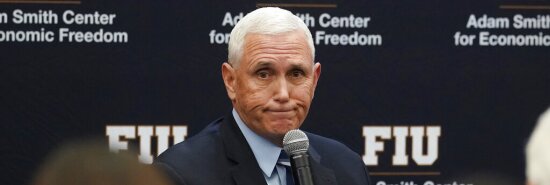
Constitutionally, Mike Pence can’t go both ways
Quin Hillyer
Video Embed
Former Vice President Mike Pence is usually a serious man, but his latest reported legal gambit is laughably fatuous.
If the reports are true that Pence plans to fight a subpoena by claiming immunity due to the Constitution’s “speech or debate clause,” then he is engaged in cheap grandstanding.
MIKE PENCE TO FIGHT SPECIAL COUNSEL SUBPOENA USING UNIQUE LEGAL ARGUMENT
Special counsel Jack Smith’s subpoena demands Pence’s testimony before a grand jury that is examining former President Donald Trump’s effort to overrule the 2020 presidential election’s results. Pence reportedly will hide behind this clause from Article I, Section 5 of the Constitution, relating specifically to “Senators and Representatives”: “For any speech or debate in either House, they shall not be questioned in any other place.”
There are two parts to Pence’s apparent legal claim, both of which are absurd. First, Pence reportedly will claim that because the vice president presides over the Senate, this gives him status as a senator. This is nonsense. The vice president is part of the executive branch and has no legislative powers — it merely has parliamentary oversight and the ability to break ties. As noted by the Brookings Institution’s Benjamin Wittes, Pence already fought a congressional inquiry on the basis that Congress can’t compel his testimony as a member of the executive branch. How can he now say the executive branch (prosecutors) can’t compel his testimony because he is a legislator?
Second, Pence must convince a judge that the “speech or debate clause” is applicable to whatever specific information the grand jury seeks. Again, poppycock. Even if the vice president actually is a senator and thus protected by the clause, which he isn’t, the clause won’t protect him. The clause isn’t a generic “get out of jail” card, much less a “get out of testifying” allowance for just any reason.
The clause protects a congressman’s right to debate and freely conduct legislative business related to floor debates. But the grand jury presumably wants to ask Pence about executive branch discussions he had with Trump about negating election results. The 11th Circuit U.S. Court of Appeals ruled in October, well in accord with a long line of Supreme Court precedents, that even for full-fledged senators, “the fact that ‘Senators generally perform certain acts in their official capacity as Senators does not necessarily make all such acts legislative in nature.’”
Here, we have a non-legislative-branch official being asked about executive branch discussions concerning non-legislative acts. In his conversations with Trump, Pence was no more engaging in protected “speech or debate” in the Senate than he was making tackles in the Super Bowl.
Pence’s purported legal claims look even more spurious when considering the case of former Rep. William Jefferson (D-LA), who was convicted two decades ago in a high-profile bribery-related case. When the FBI raided Jefferson’s legislative office, it triggered Jefferson’s claim that the speech-or-debate clause protected congressional office materials, which are quintessentially part of legislative activity. Even then, the courts provided him with only limited protections.
If that clause didn’t even make Jefferson’s own legislative office immune to search, how can it protect Pence’s conversations in the White House (or on the phone with the White House)?
CLICK HERE TO READ MORE FROM THE WASHINGTON EXAMINER
Granted, Trump may try to invoke executive privilege to keep Pence from testifying, a claim that itself is debatable but not necessarily frivolous. But there’s no such thing as executive privilege for legislative speech or debate. If Pence is planning on raising separation-of-powers claims, courts can’t grant those claims in both directions.
Pence and his legal team surely know their assertions are legally meritless. Their claims are a political ploy to convince Republican voters he isn’t “disloyal” to Trump. Alas, Pence is letting the wrong loyalty be the trump card.
